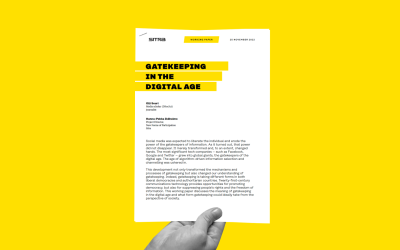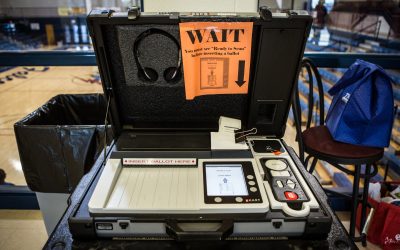
TECHNOLOGY
Latest Technology Posts
Meta’s Oversight Board Invites Comments on Martyrs
Brief #83 – Technology Policy
by Mindy Spatt
Meta’s Oversight Board has taken public comments on the way its platforms treat the Arabic word “Shaheed”, often deleting it from posts by posters Meta has deemed dangerous.
Re-Energizing the Nations’ EV Infrastructure
Brief #82 – Technology Policy
by Steve Piazza
The bipartisan Infrastructure Law passed back in November, 2021 has reportedly already provided funding for over 20,000 projects related to strengthening the nation’s present and future transportation and energy needs. Beyond providing support for more traditional activities focusing on highways and bridges, the law has paved the way for advancements in electric vehicle (EV) technologies.
Banning TikTok Won’t Make the Data Safe
Brief #81 – Technology Policy
by Mindy Spatt
TikTok is under attack from all sides. The Biden Administration is threatening to ban the app altogether, the Justice department is investigating it, advocates say it is dangerous to children, a school district is suing, and governments in the US and the UK won’t allow their workers to use it.
Will Regulation Stifle Crypto, And Do We Care?
Brief #80 – Technology Policy
By Mindy Splatt
Fans of crypto have enthusiastically told me it enables lower income people to invest and earn money. They think it is more democratic and less corrupt than the stock market. And they eschew consumer protections, believeing that in order for it to accomplish these wonders it must not be hampered by a governmental bureaucracy.
Congress Needs to Act on Bills Regulating Data Brokers
Brief #79 – Technology Policy
By Steve Piazza
Ever since Congress enacted the Electronic Communications Privacy Act of 1986 it has been unable to secure legislation to increase privacy protection that better reflects the technologies of today.
Facebook’s Advertising Practices Run Afoul of Privacy Protection Rules in Europe
Brief #53 – Technology Policy
By Mindy Spatt
A groundbreaking decision by European regulators is pushing Meta, parent company of Facebook and Instagram, to make changes to its advertising policies. The ruling goes further than any US authority has gone in limiting Facebooks’ ability to collect users’ data. Meta is expected to appeal.
The Impact of Social Media on Politics and Society
Brief #52 – Technology Policy
By Inijah Quadri
Social media has revolutionized the way we communicate, access information, and engage with politics and society. Platforms such as Facebook, Twitter, and TikTok have become an integral part of our daily lives, connecting us with friends and family, news, and entertainment.
January 10th Revealed the Need to Update Our Aviation Safety Technology
Brief #51 – Technology Policy
By Steve Piazza
The Federal Aviation Administration (FAA) requires that all pilots receive NOTAMs (Notice To Airmen, or Notice to Air Missions in the United States) prior to takeoff. The purpose of these notifications is to provide pilots with information regarding obstacles they may encounter along the way.
Who Will Be the Gatekeepers in 2023?
Brief #78 – Technology Policy
By Mindy Spatt
If anything is clear from Elon Musk’s takeover of Twitter, it is that he is ill equipped to be the arbiter of who or what should be banned from the platform. He appears to be the last person on earth anyone would choose for the job. Former CEO Jack Dorsey had no particular qualifications to do so, but his decisions didn’t garner the publicity or public dismay Musk’s have.
January 10th Revealed the Need to Update Our Aviation Safety Technology
Brief #51 – Technology Policy
By Steve Piazza
The Federal Aviation Administration (FAA) requires that all pilots receive NOTAMs (Notice To Airmen, or Notice to Air Missions in the United States) prior to takeoff. The purpose of these notifications is to provide pilots with information regarding obstacles they may encounter along the way.
Who Will Be the Gatekeepers in 2023?
Brief #78 – Technology Policy
By Mindy Spatt
If anything is clear from Elon Musk’s takeover of Twitter, it is that he is ill equipped to be the arbiter of who or what should be banned from the platform. He appears to be the last person on earth anyone would choose for the job. Former CEO Jack Dorsey had no particular qualifications to do so, but his decisions didn’t garner the publicity or public dismay Musk’s have.
Should Machine-Made Art Be Subject to Copywrite Protection?
Brief #77 – Technology Policy
By Steve Piazza
Last February, the U.S. Copyright Office upheld a rule that artwork created by machines or animals cannot be protected under copyright law. Referring to the Copyright Act of 1976, the U.S. Copyright Review Board reasserted that only works by humans can be protected.
Twitter Layoffs Spark the Latest Accusations of Sexism in Tech
Brief #76 – Technology Policy
By Mindy Spatt
Elon Musk’s takeover of Twitter has sparked outrage, layoffs and lawsuits. But the news of a sex discrimination suit by laid off employees is no surprise; it is not the first for Musk or Twitter, and the tech industry is notorious for its unequal treatment of women.
Are Tech Billionaires the Worst Polluters on Earth?
Brief #75 – Technology Policy
By Mindy Spatt
Tech Billionaires Leave an Outsize Carbon Footprint, Despite Their Carbon Neutral Claims. Advocates claim allowing polluters to purchase carbon offsets is a “scam” and hurting, rather than helping the planet.
FCC Stumbles As It Tries to Increase Access to Broadband
Brief #74 – Technology Policy
By Mindy Spatt
Will $65 billion in Infrastructure funds finally bridge the digital divide and connect the 19 million Americans who still lack access to high-speed internet? The FCC’s First Step Appears to be a Misstep.
Examining the Integrity of Voting Systems
Brief #73 – Technology Policy
By Steve Piazza
In 2002, President George W. Bush signed into law the Help America Vote Act (HAVA). HAVA’s passage enhanced existing policy established under the 1971 Federal Election Campaign Act, which created the National Clearinghouse for Information on the Administration of Elections.
Amazon is a Hazardous Place to Work, But Don’t Dare Tell the Company to Change
Brief #72– Technology Policy
By Mindy Spatt
Workers, regulators even its own investors want Amazon to improve its abysmal worker safety record. But the company has fought tooth and nail to quash those efforts.
A New Book Points the Finger at Social Media
Brief #71 – Technology Policy
By Steve Piazza
One has to wonder how many people would sign on to become addicted to a new technology promising rabbit holes of misinformation and manipulation, alienation from family and friends, and the inability for the government to protect them from it.
Oh, What a Splintered Web We Weave
Brief #70 – Technology Policy
By Steve Piazza
The Biden Administration recently announced that it was going to ease restrictions on internet usage in Iran following ongoing protests over the killing of Mashi Amini while she was in police custody for violating the country’s stringent dress code. The restrictions had been part of larger sanctions levied against Iran for its nuclear program and for state-supported acts of terrorism around the world.










